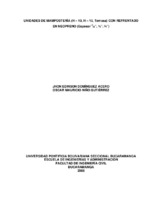Unidades de mampostería (H-10, H-15, temosa con refrentado en neopreno (espesor 3/8", 1/2", 3/4")

View/
Date
2013-06-21xmlui.dri2xhtml.METS-1.0.item-advisor
Retamoso Llamas, Claudia Patricia
xmlui.dri2xhtml.METS-1.0.item-type
bacherlorThesis
Citación
Metadata
Show full item recordDocuments PDF
Abstract
El trabajo consiste en validar el uso del neopreno como material de refrentado para unidades de mampostería. Se seleccionaron tres tipos de ladrillos H10, H15 y Temosa, de los cuales se utilizaron 150 unidades de cada tipo respectivamente. Se les aplico una mezcla agua cemento y arena comúnmente llamado mortero de un espesor de 10mm a cada ladrillo por la cara superior e inferior para garantizar que dichas caras tengan una superficie regular y paralela, logrando que la carga sea lo mas axial posible; se utilizaron 3 espesores diferentes de Neopreno 3/8”, ½” y ¾”. En el laboratorio se realizaron los ensayos a compresión en la máquina universal que consisten en colocar el ladrillo con los neoprenos tanto en la cara superior como inferior, para así ensayarlos y sacar los datos de la resistencia obtenida con la aplicación de una fuerza; mediante la operación de dividir dicha fuerza aplicada sobre el área de la superficie, el cual va a ser tabulado y mediante gráficas se observa el comportamiento que tiene el esfuerzo de compresión con cada espesor de neopreno utilizado. Con el análisis de los resultados se espera llegar a un espesor ideal de neopreno que arroje los mejores resultados en comparación con los obtenidos de los materiales que actualmente son utilizados en el proceso de refrentado, como lo son: el yeso y el azufre. Se recomendara el espesor ideal que se debe usar The work is to validate the use of neoprene as a material of leveling for units of masonry. There were selected three types of bricks H10, H15 and Macize Block, of which were used 150 units for each type respectively. A mix of water, cement and sand, commonly called mortar, with a thickness of 10mm, was applied to each brick by the top and bottom side to ensure that the faces have a regularly and parallel surface, getting the load the more axial as possible; there were used 3 different thicknesses of neoprene 3/8 ", ½" and ¾ ".
In the lab, tests were carried out to compression in the universal machine that consist in placing the brick with the neoprene both in the upper side as inferior, to test and remove the data of the resistance obtained with the implementation of a force; through the operation to divide that force applied on the area of the surface, which one will be tabulated and through graphs can be observed the behavior that has the effort of compression with each thickness of neoprene used.
With the analysis of the results is expected to reach an ideal thickness of neoprene to shed the best results in comparison with those obtained from the materials that are currently used in the process of leveling, as are: the plaster and sulphur.
It will be recommended the ideal thickness to be used.
Keyword/s
Ingeniería civil
Tesis y disertaciones académicas
Mampostería
Materiales de construcción
Trabajo de grado ingeniería Civil
Collections
- Trabajos de grado [6698]
